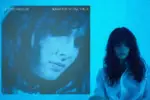Marina Diamandis has approached every aspect of her music career with unwavering confidence. When she was just 20 years old, she fully devoted herself to singing despite having no background in music, and throughout her career she experimented with personas without reserve. Her new album, “Ancient Dreams in a Modern Land,” is no exception to her signature boldness.
On this record, Marina tackles large cultural and societal issues. The album is filled with catchy tracks on feminine power and even heavy criticism of American politics — despite the artist’s own Welsh-Greek identity. Although the first half of the album has a clear political agenda, the back half features tracks on breakups and romantic relationships — a strange shift for such a politically charged opening. Though the album has its gleaming, standout moments, it ultimately feels jumbled in its attempt to wrestle with a multitude of subjects in a way that feels entirely natural. While some of the songs are clear hits, others on the album fall short.
The call-to-arms nature of these songs is new territory for the artist, who normally disguises her political messages with catchy beats and bold pop-punk assertions. She did this in her hit song from 2012, “How to Be a Heartbreaker,” a sarcastic electropop tune about women protecting their egos from heartbreak. In this earlier stage of her career, she was known by the moniker “Marina and the Diamonds” and portrayed a sparkling persona of old-world Hollywood.
But the days of Marina’s former vibe are long gone. In order for her persona and music to evolve, Marina had to grow as a person and artist. This meant taking some time off from her music career entirely. In 2016, the artist quit during the peak of her popularity to pursue a degree in psychology. Eventually, the essays she wrote at university inspired her to come back to writing music in 2019. She dropped “and the diamonds” from her name and just became “MARINA.” According to the artist, her intention in doing so was to “simplify the ways she interacted with the world as an artist.” Her passion for writing music felt like it had disappeared; she needed to find a new connection to music that wasn’t about desiring acclaim.
Not many artists have the courage to quit and leave their careers stagnant. Nor is it easy to return to the industry with a new title. Marina’s whole career was built on this kind of boldness from the time she was 18 and decided she wanted to be a singer. She did not have any musical training or songwriting experience to work with, just a dream of making it. Against all odds, after years of “rejection and embarrassment,” she finally landed a record deal at the age of 24, an unbelievable accomplishment for someone who had only started making music as a young adult.
Marina remained confident as the record deals rolled in, causing her to garner a reputation as crazy and “unhinged.” Daring to demonstrate confidence in her abilities, Marina was labeled a madwoman by music executives. The sexism that cloaked her early career and her own dedication to perseverance are undoubtedly themes she returns to on “Ancient Dreams in a Modern Land.” As she sings in the chorus of the second track on the LP, “Venus Fly Trap,” “Why be a wallflower when you can be a Venus flytrap?” This stunning metaphor for her own confidence, “doing it her own way” and not allowing fame to “change her” makes for a clever and empowering song on this crowded album.
“Ancient Dreams in a Modern Land” opens with the title track — a disco-inspired beat that preaches “not fitting into the norm” and staying away from conformity. The song works well as the precursor to the hit “Venus Fly Trap.” However, the repetition of its “be somebody else” mantra without an accompanying metaphor or storyline makes it a less powerful track than its follow-up.
Regardless, the opening track succeeds in establishing the transient location and indeterminable time period of the album’s setting with its opening line, “Our ancestors had to fight to survive.” In any era, this could speak to the hardships of the human condition — modern battles against systemic racism, fights for independence or even early versions of humans foraging for food in the wilderness. It is identifiable during any time or place where humans fought for the ideal of a brighter future.
The diamond that shines the brightest on this album, however, is the track “Man’s World.” Every lyric in this song is studded with gorgeous imagery and wordplay, allowing the song to stand out among some of the album’s more direct tracks. The most hard-hitting of the song’s lyrics cleverly alludes to the degradation of women throughout time: “Burnt me at the stake, you thought I was a witch centuries ago/ now you just call me a b—-.”
“Man’s World” has a very earthly yet colorful tone to it, accompanied by a music video featuring all types of women in a scenic bohemian civilization. The song is poetic in its allusions to not only gender roles and breaking the gender binary, but in pointing out the injustices the patriarchy has inflicted on Mother Earth as well. As she sings in the chorus, “Mother Nature’s dying/ Nobody’s keeping score/ I don’t want to live in a man’s world anymore.”
Following the beauty of “Man’s World” is another examination of injustice, “Purge the Poison.” This track feels reminiscent of Billy Joel’s “We Didn’t Start the Fire” and chaotically lists a series of societal ills that modern listeners are all too familiar with. The song covers a wide range of topics, from the COVID-19 pandemic, to Britney Spears, Harvey Weinstein and natural disasters. It ultimately concludes that power lies in listening to one another — an especially resonant note with social media culture finally giving rise to underrepresented voices and information about widespread tragedy. Though a powerful exploration of the current times, the track does not lend much else in terms of insight on these events — it feels more like Marina is just pointing them out and reminding listeners of all the recent tragedies in the world.
However, Marina turns it around again with “New America,” addressing the country as if it were a person in need of repentance. Marina attacks the fraudulence behind the coveted American Dream and the price of “freedom” beautifully: “You got a white picket fence, and your dad’s got a gun.” Her call for America to “purge its poison” by repaying its dues makes for another of the album’s hidden gems.
The album takes a turn from this point forward, both in content and musical style. Not only does it transition from upbeat pop to a much softer sound, but the focus shifts to a more intimate portrayal of love. “Flowers” and “I Love You But I Love Me More” are confident portrayals of choosing yourself in a relationship, not sacrificing for the other person. In these songs, Marina absolves herself of blame for the crumbling of a relationship; it is not her fault that her former lover failed to adapt. Ultimately, she proved to be worth more than what they offered. Marina spreads the message that it is not the woman’s responsibility to fix nor stay in a broken relationship — an undeniably powerful message for any listener.
“Flowers” continues the naturalistic motif of the first half of the album. Unlike the brutality of the “Venus fly trap” or the passivity of the “wallflower,” the metaphor of the “flower” in this song is more delicate. Flowers are a symbol of her former partner’s lack of respect for her and thus her waning desire to stay in the relationship. It seems no accident that Marina uses “flowers,” a traditionally feminine-coded object, to symbolize this.
The final track of the album, “Goodbye,” is Marina’s final farewell to her late persona. She puts to bed not only the person she was in her music career, but the person she was in her last relationship. The most poignant line of the song ties back perfectly to the previous themes of the album. She conjures the image of women as the givers of life to the world and then subverts it: “I’ve been a mother to everyone else/ to every motherf—– but myself/ and I don’t even have any kids.”
Full of all that Marina embodies best as an artist — ear-candy-worthy beats, shining lyrics and powerhouse vocals — “Ancient Dreams in a Modern Land” is a stunning album with tracks that deserve a place among the pantheon of Marina’s top hits. While a gallant attempt at making a statement that definitely lands in places, the album lacks an overall cohesion and at times spells things out too explicitly for listeners. However, “Ancient Dreams in a Modern Land” reminds fans why they love Marina and have stuck with her through it all. Her sound is authentic, brave and unlike that of any other artist.

















